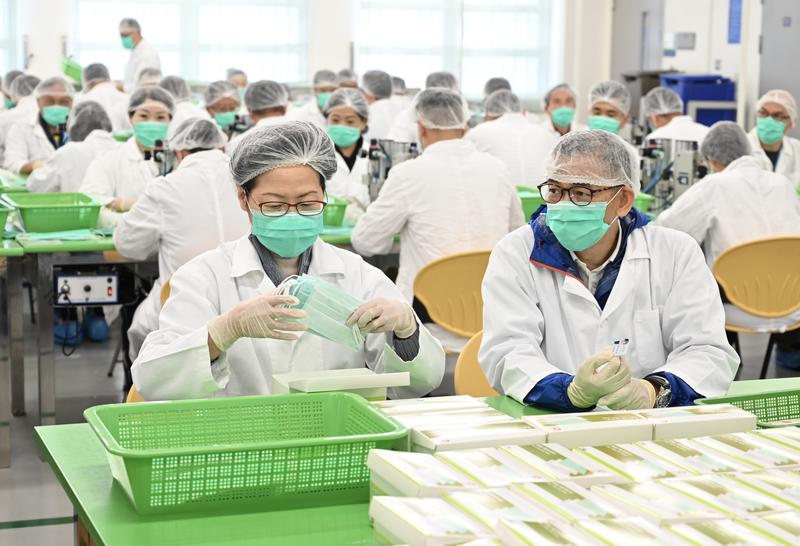 Hong Kong Chief Executive Carrie Lam Cheng Yuet-ngor (left) helps pack surgical masks at Lo Wu Correctional Institution of the Correctional Services Department on Sunday. (INFORMATION SERVICES DEPARTMENT)
Hong Kong Chief Executive Carrie Lam Cheng Yuet-ngor (left) helps pack surgical masks at Lo Wu Correctional Institution of the Correctional Services Department on Sunday. (INFORMATION SERVICES DEPARTMENT)
Beginning Thursday, people who arrive in Hong Kong and have been in Ireland, the United Kingdom, the United States and Egypt in the past 14 days must be quarantined at home for 14 days, the SAR government announced on Sunday.
Also on Sunday, the government issued “red” outbound travel alerts for Ireland, the UK and the US. Such an alert has been in place for Egypt for security reasons since 2014.
By Saturday, the US and UK had recorded 1,678 and 802 infection cases respectively, while the numbers in Egypt and Ireland were 93 and 90 respectively, according to the World Health Organization.
In a government statement, a spokesman for the Centre for Health Protection said that from March 2 through Sunday, more than half of the 46 infection cases in Hong Kong were imported cases. Seven other patients visited places outside Hong Kong during part of the incubation period. So far, Hong Kong has recorded 148 infection cases.
Explaining the home-quarantine arrangement, the spokesperson said the government needs to reserve quarantine centers for the close contacts of confirmed patients because of the limited capacity of the city’s quarantine facilities.
Previously, the government adopted quarantine measures of some other countries hard-hit by the pandemic. They include South Korea, Japan and Iran, and the 26-country Schengen Area.
The WHO declared the coronavirus outbreak as a global pandemic on Wednesday. By Saturday, a total of 134 overseas countries and regions outside China has reported more than 60,000 infection cases, according to the organization.
In view of the situation, Australia announced that effective Monday (local time), all arrivals have to be quarantined for two weeks. Several local travel agencies have temporarily canceled tour groups to the country.
At a news conference on Sunday, Chuang Shuk-kwan of the Centre for Health Protection of the Department of Health said that to further contain the virus spread, the government is studying the feasibility of conducting tests for all arrivals at the border or conducting spot checks to detect asymptomatic patients. Virus tests for all arrivals have already been adopted in Guangdong province.
She also called on the city’s private doctors to increase the number of virus tests of patients. She said that private clinics and hospitals are currently conducting fewer than 100 tests a day combined. Lau Ka-hin, a chief manager of the Hospital Authority, said at the conference that public clinics test 300 to 500 samples per day.
Earlier in the day, the city’s leading microbiologist, Yuen Kwok-yung, said the city is capable of testing 2,000 samples per day at the most. More tests could help with the epidemic control and related policymaking, he said.
On Sunday, the city had recorded seven more infection cases, six of whom had visited overseas areas recently, bringing the total tally to 148.
Among the newly confirmed cases is a 35-year-old man who visited Hokkaido in Japan and a 29-year-old man who visited Germany and Austria. The other new overseas-travel cases are two men who recently were on vacation in France together, and a foreign couple who recently visited Canada and the US.
On Saturday night, 43 residents of Fu Heng Estate’s Hang Tai building in Tai Po were evacuated after three residents living in the building were found to be infected by the virus. Most of them have moved into quarantine centers for medical observation.


